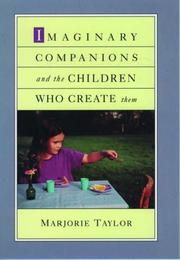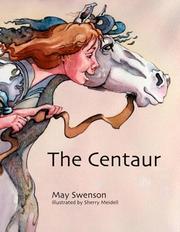| Listing 1 - 5 of 5 |
Sort by
|
Book
ISBN: 157366863X 9781573668637 9781573661034 Year: 2015 Publisher: [Place of publication not identified]
Abstract | Keywords | Export | Availability | Bookmark
 Loading...
Loading...Choose an application
- Reference Manager
- EndNote
- RefWorks (Direct export to RefWorks)
Couples --- Photography --- Childlessness --- Imaginary companions --- Companions, Imaginary --- Friends, Imaginary --- Imaginary friends --- Imaginary playmates --- Playmates, Imaginary --- Child psychology

ISBN: 0195349156 1429403373 9780195146295 0195146298 9781429403375 1280531983 9781280531989 9786610531981 6610531986 9780195349153 0195146298 0195077040 9780195077049 0190287136 Year: 1999 Publisher: New York Oxford Oxford University Press
Abstract | Keywords | Export | Availability | Bookmark
 Loading...
Loading...Choose an application
- Reference Manager
- EndNote
- RefWorks (Direct export to RefWorks)
Imaginary companions are a common form of childhood fantasy of interest to parents, educators, and psychologists because they provide insights about children's creativity, thoughts and feelings.
Imaginary companions. --- Companions, Imaginary --- Friends, Imaginary --- Imaginary friends --- Imaginary playmates --- Playmates, Imaginary --- Child psychology --- Imagination in children --- Play --- Imagination in children. --- Play.

ISBN: 0874216486 9786613250124 1283250128 0874216729 9780874216721 9780874216486 9781283250122 6613250120 Year: 2007 Publisher: Logan, Utah : Utah State University Press,
Abstract | Keywords | Export | Availability | Bookmark
 Loading...
Loading...Choose an application
- Reference Manager
- EndNote
- RefWorks (Direct export to RefWorks)
Can it be there was only one summer that I was ten?First published in 1956, May Swenson's ""The Centaur"" remains one of her most popular and most anthologized poems. This is its first appearance as a picture book for children. In images bright and brisk and tangible, the poet re-creates the joy of riding a stick horse through a small-town summer. We find ourselves, with her, straddling "a long limber horse with . . . a few leaves for a tail," and pounding through the lovely dust along the path by the old canal. As her shape shifts from child to horse and back, we know
Horses --- Imagination --- Imaginary companions --- Companions, Imaginary --- Friends, Imaginary --- Imaginary friends --- Imaginary playmates --- Playmates, Imaginary --- Imagery, Mental --- Images, Mental --- Mental imagery --- Mental images --- Child psychology --- Educational psychology --- Intellect --- Psychology --- Reproduction (Psychology)
Book
ISBN: 1282764470 9786612764479 0520947886 9780520947887 9780520265462 0520265467 9780520265479 0520265475 Year: 2010 Publisher: Berkeley University of California Press
Abstract | Keywords | Export | Availability | Bookmark
 Loading...
Loading...Choose an application
- Reference Manager
- EndNote
- RefWorks (Direct export to RefWorks)
Friends-they are generous and cooperative with each other in ways that appear to defy standard evolutionary expectations, frequently sacrificing for one another without concern for past behaviors or future consequences. In this fascinating multidisciplinary study, Daniel J. Hruschka synthesizes an array of cross-cultural, experimental, and ethnographic data to understand the broad meaning of friendship, how it develops, how it interfaces with kinship and romantic relationships, and how it differs from place to place. Hruschka argues that friendship is a special form of reciprocal altruism based not on tit-for-tat accounting or forward-looking rationality, but rather on mutual goodwill that is built up along the way in human relationships.
Friendship --- Kinship. --- Human behavior. --- Interpersonal relations. --- Social aspects. --- affect theory. --- africa. --- altruism. --- animal friendships. --- anthropology. --- biocultural anthropology. --- china. --- companionship. --- cooperation. --- cultural anthropology. --- emotions. --- ethnography. --- evolution. --- evolutionary biology. --- family relationships. --- fear. --- friendship. --- generosity. --- germany. --- goodwill. --- human behavior. --- iceland. --- imaginary friends. --- kinship. --- maasai. --- nonfiction. --- platonic relationships. --- psychology. --- reciprocal altruism. --- reciprocity. --- relationships. --- reputation. --- romantic relationships. --- russia. --- science. --- shame. --- social networks. --- society. --- trust.
Book
ISBN: 9781512824292 1512824291 Year: 2023 Publisher: Philadelphia : University of Pennsylvania Press,
Abstract | Keywords | Export | Availability | Bookmark
 Loading...
Loading...Choose an application
- Reference Manager
- EndNote
- RefWorks (Direct export to RefWorks)
In this book, renowned anthropologist Michael Jackson draws on philosophy, biography, ethnography, and literature to explore the meanings and affordances of friendship—a relationship just as significant as, yet somehow different from, kinship and love. Beginning with Aristotle’s accounts of friendship as a political virtue and Montaigne’s famous essay on friendship as a form of love, Jackson examines the tension between the political and personal resonances of friendship in the philosophy of Hannah Arendt, the biography of the Indian historian Brijen Gupta, and the oral narratives of a Kuranko storyteller, Keti Ferenke Koroma. He offers reflections on childhood friends, imaginary friends, lifelong friendships, and friendships with animals. He ruminates particularly on the complications of friendship in the context of anthropological fieldwork, exploring the contradiction between the egalitarian spirit of friendship on the one hand and, on the other, the power imbalance between ethnographers and their interlocutors.Through these stories, Jackson explores the unpredictable interplay of mutability and mutuality in intimate human relationships, and the critical importance of choice in forming friendship—what it means to be loyal to friends through good times and bad, and even in the face of danger. Through a blend of memoir, theory, ethnography, and fiction, Jackson shows us how the elective affinities of friendship transcend culture, gender, and age, and offer us perennial means of taking stock of our lives and getting a measure of our own self-worth.
Friendship. --- Interpersonal relations. --- Anthropology of Friendship. --- Aristotle. --- C.S. Lewis. --- Childhood Friends. --- Companion Animals. --- Elective Affinities. --- Friendship and love. --- Friendship in Philosophy. --- Hannah Arendt. --- Imaginary Friends. --- J.R.R. Tolkien. --- Jacques Derrida. --- Kuranko people. --- Montaigne. --- Sierra Leone. --- ethnography. --- fieldwork. --- memoir. --- personal essay.
| Listing 1 - 5 of 5 |
Sort by
|

 Search
Search Feedback
Feedback About UniCat
About UniCat  Help
Help News
News